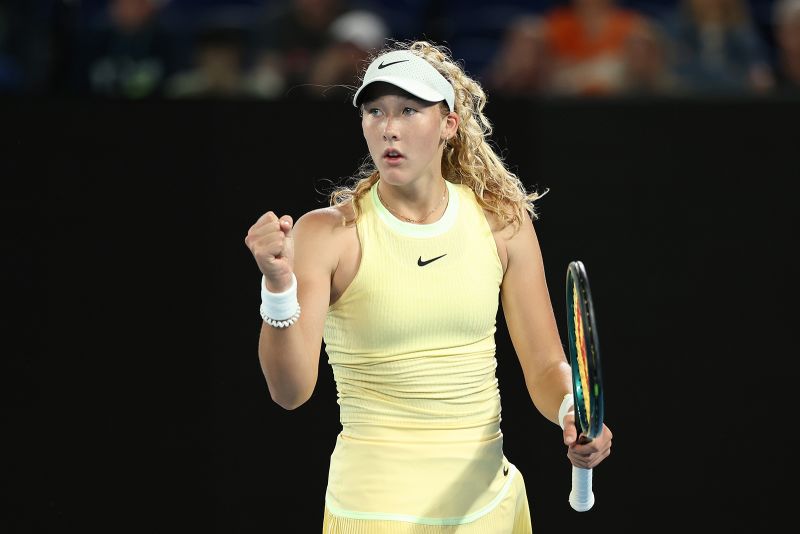
Ukrainian Tennis Players Use Australian Open as Platform to Highlight Country's Plight

Ukrainian tennis players Marta Kostyuk and Lesia Tsurenko are leveraging their presence at the Australian Open to bring attention to the ongoing struggles faced by their country and families back home. Despite their focus on tennis, the impact of the invasion of Ukraine is evident in their actions on and off the court.
The Ongoing Plight of Ukraine
The invasion of Ukraine by Russia nearly two years ago continues to cast a shadow over the lives of its citizens, including Ukrainian tennis players Marta Kostyuk and Lesia Tsurenko. Their participation in the Australian Open has become more than just a sporting event; it has become a platform to shed light on the ongoing challenges faced by their country and the distressing conditions experienced by their families back home.
Mirra Andreeva celebrates a point in her match against Ons Jabeur at the 2024 Australian Open.
Kostyuk, who recently achieved a significant milestone by reaching the fourth round of the Australian Open, chose to use her post-match interviews not to dwell on her personal triumph but to draw attention to the harrowing circumstances endured by her family in Ukraine. She revealed that her mother sends her videos of missiles flying over their house, a stark reminder of the ongoing conflict and its toll on the lives of her loved ones.
Similarly, Tsurenko, despite a difficult defeat on the court, remained resolute in her commitment to highlighting the impact of the war on her country. Her decision to refrain from shaking hands with players from Russia and Belarus, countries associated with the invasion, was a poignant expression of solidarity and a reflection of the emotional turmoil that accompanies her participation in the tournament.
Lesia Tsurenko did not shake Aryna Sabalenka's hand after their match.
Challenges On and Off the Court
For Kostyuk and Tsurenko, the weight of the conflict in Ukraine permeates every aspect of their lives, both on and off the court. The psychological toll of witnessing their homeland embroiled in turmoil is evident in their actions, as they navigate the complexities of competing in a prestigious tournament while grappling with the haunting reality of the war.
Their decision to refrain from customary post-match handshakes with players from Russia and Belarus is a poignant symbol of their unwavering stance against the aggression and oppression faced by their country. It is a reminder that, for these athletes, the competition extends beyond the confines of the tennis court, encompassing a deeper commitment to advocating for peace and justice for Ukraine.
Furthermore, Tsurenko's poignant revelation regarding the difficulty of forming relationships with players from Russia and Belarus highlights the emotional and moral dilemmas that accompany her interactions within the tennis community. The lack of acknowledgment or condemnation of the war from the majority of players from these countries has reinforced the challenges faced by Ukrainian athletes, deepening the divide and complicating the dynamics within the tour.
A Platform for Advocacy and Solidarity
The Australian Open has emerged as a stage for Kostyuk and Tsurenko to not only showcase their athletic prowess but also to amplify the voices of their fellow Ukrainians and bring attention to the plight of their nation. Their unwavering commitment to using their platform to raise awareness about the ongoing crisis in Ukraine serves as a testament to the resilience and strength of the human spirit in the face of adversity.
Their refusal to engage in customary post-match gestures with players from Russia and Belarus is a powerful statement of solidarity, a symbolic act that transcends the boundaries of sports and resonates with the global community. It is a poignant reminder that, in the midst of intense competition, the spirit of unity and advocacy for justice can prevail, transcending individual victories and defeats.
As they continue to navigate the challenges of the tournament, Kostyuk and Tsurenko embody the spirit of resilience and determination, using their presence at the Australian Open as a platform to advocate for peace, express solidarity with their homeland, and inspire others to stand in support of Ukraine's journey towards healing and recovery.















